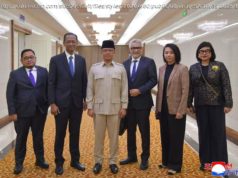The front-runner wants to take a less hawkish approach in dealing with North Korea.
Relations with the United States hang in the balance when South Koreans head to the polls at a tumultuous political time to elect a new president Tuesday.
Human rights lawyer Moon Jae-in, 64, the candidate of the left-leaning Democratic Party of Korea, leads polls by a large margin over his nearest competitor, conservative Hong Joon-pyo.
Moon’s stances, particularly over relations with neighboring North Korea, could open a rift with the U. S., in contrast to former president, Park Geun-hye, whose impeachment over corruption charges in March triggered the election. Park had been more hawkish in dealing with North Korea.
Moon has been critical of the U. S. deployment of an anti-ballistic missile defense system known as THAAD (Terminal High Altitude Area Defense) in South Korea, a military move Park had endorsed. The U. S. began deploying elements of THAAD in late April on an abandoned golf course outside of Seoul and announced it was operational earlier this week.
Moon argued that the U. S. should have waited for a new president to make the final decision to install the $1 billion system, which the Pentagon apparently rushed to make operational for fear Moon might block it if elected.
“We express strong regret over the THAAD (installation) taking place in disregard of the people’s will and procedures, ” Park Kwang-on, public relations chief of Moon’s election campaign, said at a news briefing on April 26.
Moon’s conservative critics fear he will try to revive the “Sunshine Policy” of 1998-2008, when liberal administrations actively engaged North Korea but ultimately failed to stop the isolated communist regime from developing a stockpile of nuclear weapons and ballistic missiles.
President Trump rattled U. S.-South Korea relations in a recent interview with Reuters when he said he wanted South Korea to pay for the cost of THAAD. “We’re going to protect them, ” Trump said. “But they should pay for that, and they understand that.”
Trump also said he planned to renegotiate or scrap the free-trade pact between the U. S. and South Korea, calling it a “horrible” deal.
In addition, Trump has consistently talked tough against North Korea, hinting at military action to end its nuclear and missile threats. That sparks fear of North Korean retaliation against the South Korean capital of Seoul, a metropolitan area of 25 million a mere 35 miles from North Korea’s border.
Moon seeks to re-position South Korea in its dealings with North Korea. “We must lead the efforts to solve problems related to the (Korean) peninsula, ” he said during his campaign last month, “and our allies and neighboring countries, including the United States, should take on a role to support our leadership.”
In a book he wrote earlier this year, Moon said South Korea should learn to “say no” to the United States, where nearly 30,000 troops remained stationed since the end of the Korean War more than 60 years ago..
A changed tone from Seoul may initially give Trump “a little bit of whiplash, ” said Scott Snyder, a senior fellow for Korea studies at the Council on Foreign Relations.
But if Moon is elected, he will face a difficult time pushing through a new approach, Snyder predicted. His Democratic Party is a minority in parliament and public sentiment is not strongly behind a thaw in relations with North Korea.
Other analysts predict the vital South Korea-U. S. military alliance is likely to remain intact. “We’ re going to see changes in the relationship (if Moon wins) , but the security alliance as a whole is going to remain strong, ” said Scott Seaman, Asia director at Eurasia Group, a New York-based political risk consultancy. “I don’ t see either side heading towards a cliff. The relationship is just far too important for both sides.”
Seaman said the “more volatile” factor in the relationship right now is Trump “because no one really knows what he wants, if he’s going to remain consistent in what he says he wants, how much of energy and time is he actually going to spend on this issue.”
“My sense is, if you’ re an ally, this is pretty disconcerting, ” he said.






